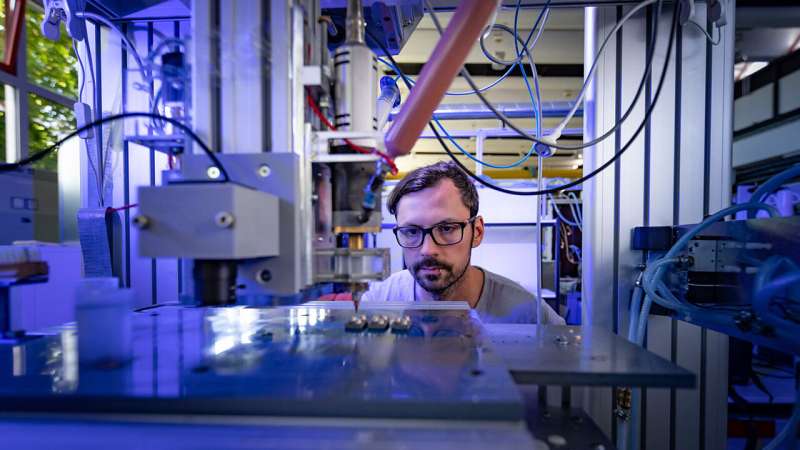Temperature-resistant power semiconductors from a 3D printer

Researchers at the Professorship of Electrical Energy Conversion Systems and Drives at Chemnitz University of Technology have succeeded for the first time in 3D printing housings for power electronic components that are used, for example, to control electrical machines. During the printing process, silicon carbide chips are positioned at a designated point on the housing.
As with the printed motor made of iron, copper and ceramics, which the professorship first presented at the Hannover Messe in 2018, ceramic and metallic pastes are also used in the 3D printing of housings. “These are sintered after the printing process, together—and this is what makes them special—with the imprinted chip,” says Prof. Dr. Ralf Werner, head of the Professorship of Electrical Energy Conversion Systems and Drives. Ceramic is used as an insulating material and copper is used for contacting the gate, drain and source areas of the field-effect transistors. “Contacting the gate area, which normally has an edge length of less than one millimeter, was particularly challenging,” adds Prof. Dr. Thomas Basler, head of the Professorship of Power Electronics, whose team supported the project with initial functional tests on prototypes.
Following the ceramic-insulated coils printed at Chemnitz University of Technology, which were presented at the Hannover Messe in 2017, and the printed motor, drive components that can withstand temperatures above 300 °C are now also available. “The desire for more temperature-resistant power electronics was obvious, because the housings for power electronic components are traditionally installed as close as possible to the engine and should therefore have an equally high temperature resistance,” says Prof. Werner.
A research team led by Johannes Rudolph, who helped develop the 3D printing process, produced several prototypes of the additively packaged silicon carbide-based power semiconductors in recent months. “In addition to excellent temperature resistance, this technology offers other advantages,” Rudolph said. The scientists expect the two-sided, flat and solder-free contacting of the chips to result in a longer service life in terms of the number of load cycles, as well as better cooling and thus usability of the chips. “Due to the higher thermal conductivity of ceramics compared to plastics and the design freedom common to 3D printing, it is easy to realize specially adapted cooling geometries in the housing and on its surface,” assures Rudolph. In addition, only a single work step is required to manufacture a power electronic component after production of the silicon carbide chips themselves.
Provided by
Technische Universität Chemnitz
Citation:
Temperature-resistant power semiconductors from a 3D printer (2022, July 6)
retrieved 6 July 2022
from https://techxplore.com/news/2022-07-temperature-resistant-power-semiconductors-3d-printer.html
This document is subject to copyright. Apart from any fair dealing for the purpose of private study or research, no
part may be reproduced without the written permission. The content is provided for information purposes only.
For all the latest Technology News Click Here
For the latest news and updates, follow us on Google News.

